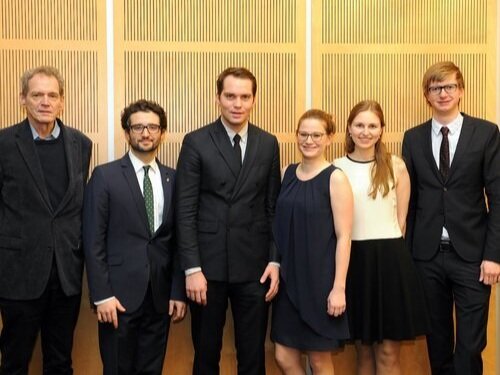Obermayer German Jewish History Award
Johann Fleischmann
Muehlhausen, Bavaria
Fifty-three-year-old Johann Fleischmann loves his hometown, the small village of Muehlhausen. An engineer and a respected member of the community, he has long known about the esteemed Jewish citizens who once made up one-third of the population. When he began to research the history of his village, he found out just how much Jewish and non-Jewish neighbors intermingled and shared in the joys and dramas of everyday life: "In about 1819, a daughter of one of my ancestors married a Jew," he explains. "She was pregnant with his child and he converted to Christianity in order to marry her."
It is these kinds of forgotten connections that Johann Fleischmann has been researching for over twenty years in the villages of the Steigerwald region of Franconia. He writes about them in books and local papers, leads tours of Jewish sites, documents headstones in the eight Jewish cemeteries of the region, and talks to students at local schools about Jewish history. "My commitment is to keep the Jewish past alive," he declares. "I hope I can impart to others what is important to me: that we have lost something truly valuable with the demise of our Jewish citizens."
Responsible for the historical training of soldiers during his twelve-year military service, Fleischmann has always been interested in history. An oral history enthusiast, he often listened to his father tell anecdotes about his Jewish friends before the war. The older his father got, the more gripping his father's stories became. He began to switch on the tape recorder, which led him to interview other elderly villagers. Then he contacted archives, as far-reaching as in New York, which held information on the Jewish community of his region. "In the first few years of my research, I just entrenched myself in historic information about Jewish life," he says.
By the early nineties, he began to share his knowledge, leading guided tours in the local Jewish cemetery. In 1994, he published his first book, the story of the Muehlhausen Kindergarten, still in use today, which was founded in the 1920s by two wealthy Jewish brothers who had emigrated to the United States. Two years later, he co-founded a research group, Arbeitskreis Juedische Landgemeinden an Aisch, Aurach, Ebrach und Seebach, a circle of amateur historians interested in researching the German-Jewish past of the region. Their work has resulted in an on-going series of publications entitled "Mesusa" (mezuzah). Fleischmann not only contributes most of the articles, he also prints the publications at his own cost and sends them gratis to Jews researching their roots. "Fleischmann is the mainspring of the research group," says local journalist Rainer Groh. "One cannot overestimate what he does for the rediscovery of Jewish history and culture."
For Fleischmann, who has always had a strong sense of social justice, there is a political dimension to his work in reclaiming the past. In the early1990s, he successfully lobbied for a monument in honor of the twenty-one deported Muehlhausen Jews. In Adelsdorf, a neighboring village, he rallied with other activists to get a street renamed. Fleischmann explains, "It bore the name of a school headmaster from the Nazi era. Former residents had told us that he had victimized Jewish students."
Fleischmann is also a well-known figure outside his community; he communicates with Jews world-wide who have their roots in the region. Periodically, he sends out newsletters to his 150 international contacts. Those researching information on their Jewish families praise his generous help. "Johann leaves no stone unturned and delves ever deeper into archives and possible sources," says Martha Lev-Zion from Israel. "It takes a caring person to devote so much time, energy, and money to collect this information just so he can impart it to others. "
Presently he is concerned about the edifice that once was the Muehlhausen synagogue, currently used as a barn by its owner. "I see it as my responsibility that this building be used appropriately," he states. Fleischmann imagines a cultural center owned by the village. But with the current ownership situation, this a project for the future. With the rehabilitation of the synagogue on the back burner for the moment, Fleischmann continues his research and his interviews. "Nothing is more important than finding people who are still alive and who can pass on their memories," Johann Fleischmann explains. "Otherwise, some right wing extremists will come along and say it wasn't at all like that."
THIS WALL BRINGS PEOPLE TOGETHER
Students at this Berlin elementary school, built on the site of a synagogue, have been building a wall for the past two decades. It delivers a powerful message about community.
STUDENTS REACHING STUDENTS
When a handful of ninth graders from Berlin met Rolf Joseph in 2003, they were inspired by his harrowing tales of surviving the Holocaust. So inspired that they wrote a popular book about his life. Today the Joseph Group helps students educate each other on Jewish history.
“I SPEAK FOR THOSE WHO CANNOT SPEAK”
Margot Friedländer’s autobiography details her struggles as a Jew hiding in Berlin during World War II. Now 96, she speaks powerfully about the events that shaped her life and their relevance today.



